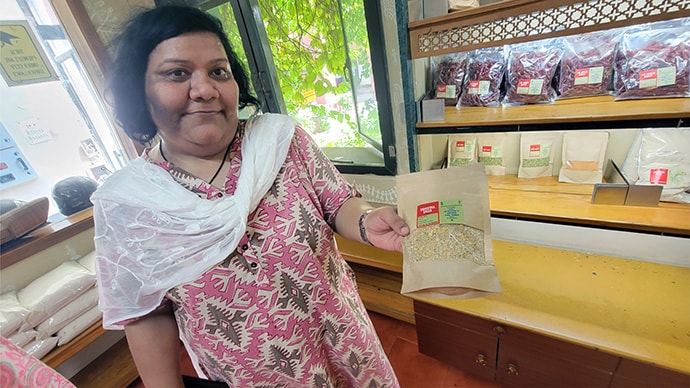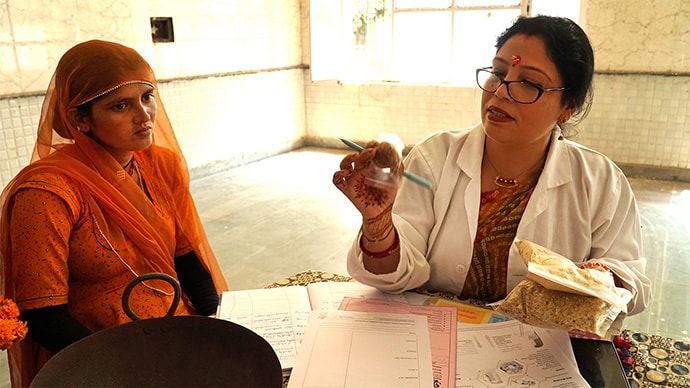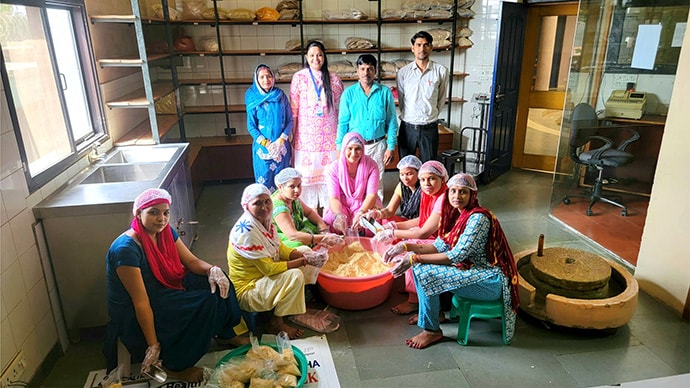By Meera Satpathy, Founder & Chairperson, Sukarya

Shipra, a Sukarya volunteer for 25 years, showing a nutritional lentil blend, safely packaged and well-labeled. Photo: Joel Meyers
“Food systems are defined by political decisions and the differential power of actors to influence those decisions”
– Olivier de Schutter, UN special rapporteur on the right to food from 2008 to 2014
The food system needs to become a public health priority. Developing policies and regulatory frameworks should be an integral part of the country. This will be ensured by establishing and implementing effective food safety systems.
A safe food system can ensure that the food supply is of high nutritional quality by enforcing regulations that promote nutrition, nutritious food, and accurate labeling, and consumers should be well informed to make the right choices for safe food handling. When consumers have confidence and appropriate knowledge of the food they consume, they are more likely to choose a balanced meal.
Food security at the household level – growing your own food, and savings
Food saved for difficult times is extremely important to ensure that the family has nutritious food to eat at all times. The past two decades have also seen a major shift in the understanding of the policy responses required to improve nutrition and its correlation with the empowerment of women. It is absolutely clear that an enabling environment plays a crucial role and that policies to change the aspects of the food environment are required, such as (revival of locally grown foods, forbidden food, food preservation, encouraging savings to purchase food during required times) more education and information on nutrition is absolutely essential. Then access to provision and action access to entitlements, access to food security schemes like ICDS, PDS, school, and Mid-Day meals significantly support families during deficiency. Hence, it’s important equally to access entitlements and support interventions to the communities to avail it. The process of asserting their rights has been a struggle and continues to be so though, women are more up to pick up the struggle. So, in essence, access to these entitlements will mean nutritious food for their children, save them from serious diseases, and given the remoteness and poverty levels, pregnant women can be taken care of in the villages.

Sukarya health worker describing the healthy provisions for a pregnant mother – high protein and high iron content is essential. These provisions are supplied at Sukarya maternal health clinics. Re-implementing the traditional iron wok for cooking (as opposed to more modern aluminum woks) helps women get essential iron in their meals. Photo: Joel Meyers
Grow your own nutritional garden
Kitchen Garden practices should be promoted continuously, and their approach has been globally acclaimed as a highly effective strategy. The Food and Agriculture Organization also recognizes that gardening can contribute to food security. By having direct access, it can provide multiple advantages such as saving builds, giving, earning the ability to sell it, locally, and enhancing the great potential for household food security.
Then drying and good storing
Building on the household’s knowledge of drying and storing the food should be encouraged and expanded more. It can be built on local wisdom to strengthen food security, which will also extend the shelf life of food for nutrition.
Developing nutritional science-sensitive agricultural programs enables the community through knowledge inputs to help decide the crops to sow from a food security and nutritional point of view. This adds up to maximize the opportunity for agriculture to address nutrition. Farmers can be helped to identify and select crops to support their own needs for nutritional intake. Agricultural interventions can improve the capacity, productivity, and future prospects of the farmers and contribute to undernutrition.
Sukarya as a leading nonprofit organization has been actively working on to enhance access to wash components, improving education, healthcare, reducing anemia and malnutrition and providing low-cost meal plans to pregnant mothers and children promoting breastfeeding, and advocating kitchen gardens for easy access to nutrition and food security in the rural and urban slum areas for disadvantage people. Moreover just supplying nutrients won’t end the battle if the body cannot absorb and utilize the supplied nutrients due to illness, worm infestation, or environmental issues like poor drinking water supply or lack of sanitation and hygiene.

Sukarya women education and economic empowerment program. Here, women are taught to grind and sell their own nutritional flour, and are provided guidance how to use these skills in their communities. Photo: Joel Meyers
What is desired in the future?
For a nutrition-secured world, the future food system must be resilient, climate-smart, caring, inclusive, and accountable. The women and children are the hardest hit. To be inclusive and caring are the lessons from the recent pandemic. In today’s time, when climate change is real and making food less nutritious, the future food systems must ensure sustainable planet health and dignity.
Applying breakthrough research and technology like artificial intelligence and machine learning to promote old and new food systems would be the future need. Like millet, bio-fortified crops that are rich in macro and micronutrients have future potential. The meaningful integration of our traditional and modern food systems can empower and improve access to safe and nutritious diets the world needs today. Hopefully, future food systems can solve problems related to all forms of hunger and malnutrition.